- Music
- 27 Dec 23
12 INTERVIEWS OF XMAS: CMAT on the Church, Sinéad O'Connor, Transphobia, Irishness, and Crazymad, For Me

As part of our 12 Interviews of Xmas series, we're looking back at some of our unmissable interviews of 2023. Back in October, CMAT returned with her unapologetically frank new spin on the ‘break-up album’: Crazymad, For Me. During a visit home to Dublin, she sat down with Hot Press for a remarkably wide-ranging conversation about feminism, transphobia, Irishness, the church, KNEECAP, Sinéad O’Connor, Fontaines D.C., Bertie Ahern and more…
Originally published in Hot Press in September 2023:
Embracing her lifelong penchant for the weirder, and slightly creepier, side of arts and crafts, CMAT is glueing a galaxy of googly eyes onto her hand with a Pritt-Stick. It’s an experiment for her Hot Press cover shoot, but her make-up artist is sceptical – she thinks it looks like a blistering rash.
Between the googly eyes, the sequin dalmatians on CMAT’s vintage waistcoat, and the Philomena Begley LP laid out on the table of her penthouse hotel room, it’s a fittingly eclectic aesthetic for a sit-down with Ireland’s most unabashedly audacious, extravagant, spiritually-inclined, yet consistently self-deprecating pop star. A walking bundle of influences, references and, in proper Dublin form, contradictions, the singer-songwriter is back in her hometown for a special gig with her recent collaborator John Grant at the National Concert Hall – a tribute to the late country star Patsy Cline.
The last time I heard CMAT singing Patsy Cline was in a kitchen in Dublin at approximately 3.30am, in the run-up to Christmas 2020. From there to the National Concert Hall, a lot has clearly changed for her in the past three years.
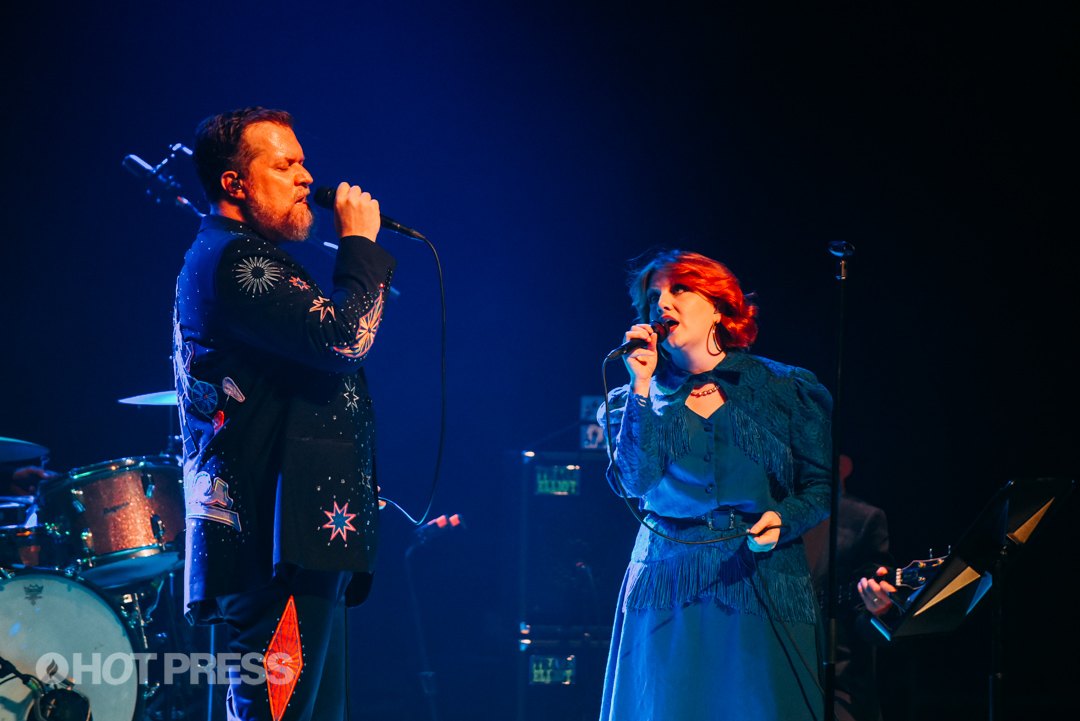
John Grant and CMAT at the National Concert Hall. Tuesday 26th of September 2023. Copyright Miguel Ruiz.
“I haven’t been home for normal reasons in a really long time,” CMAT, or Ciara Mary-Alice Thompson, acknowledges now, in the middle of a typically crammed day. “It’s kind of sad – it’s always like this when I come home now. But hopefully when the album is out, I can…”
She trails off, before adding, with a laugh: “...Make another album, probably!”
CMAT’s unique, platitude-free brand of pop – as established on her 2021 Diet Baby EP, and her Choice Music Prize-winning debut album, If My Wife New I’d Be Dead, released the following year – comes from an inherently Irish place, complete with morbid humour, Catholic guilt, and other distinct cultural nuances.
But this approach has captured the imagination of a remarkably far-reaching audience – earning serious praise and attention from the likes of Robbie Williams and the BBC, as well as support slots for Florence + The Machine and Beck, and a raved-about Glastonbury set, all in the past year. Her career is taking off rapidly, and somewhat unexpectedly, in France, too – which she’s preparing for by embarking on an intensive, immersive French language course.
Of course, this year also saw CMAT finally attain her true form: plastered along the length of a Times Square skyscraper on a Spotify billboard.
TELL THE FUCKING STORY
All of that has led her here, to the release of her deeply personal, and gloriously gutsy second album, Crazymad, For Me, recorded with producer Matias Téllez in Norway.
“It was really fun, and tiring, and weird – because there’s only like four hours of daylight in Norway in January,” she says of the recording process. “The sun was going up and going down while I was in the studio, so I never saw sunlight. I’d just be looking out the window at it like, ‘Hey, girly!’
“I also had the worst pint of Guinness I’ve ever had in my entire life in Bergen – and it was 15 Irish euros,” she adds. “And it’s like €35 for a Big Mac meal.”
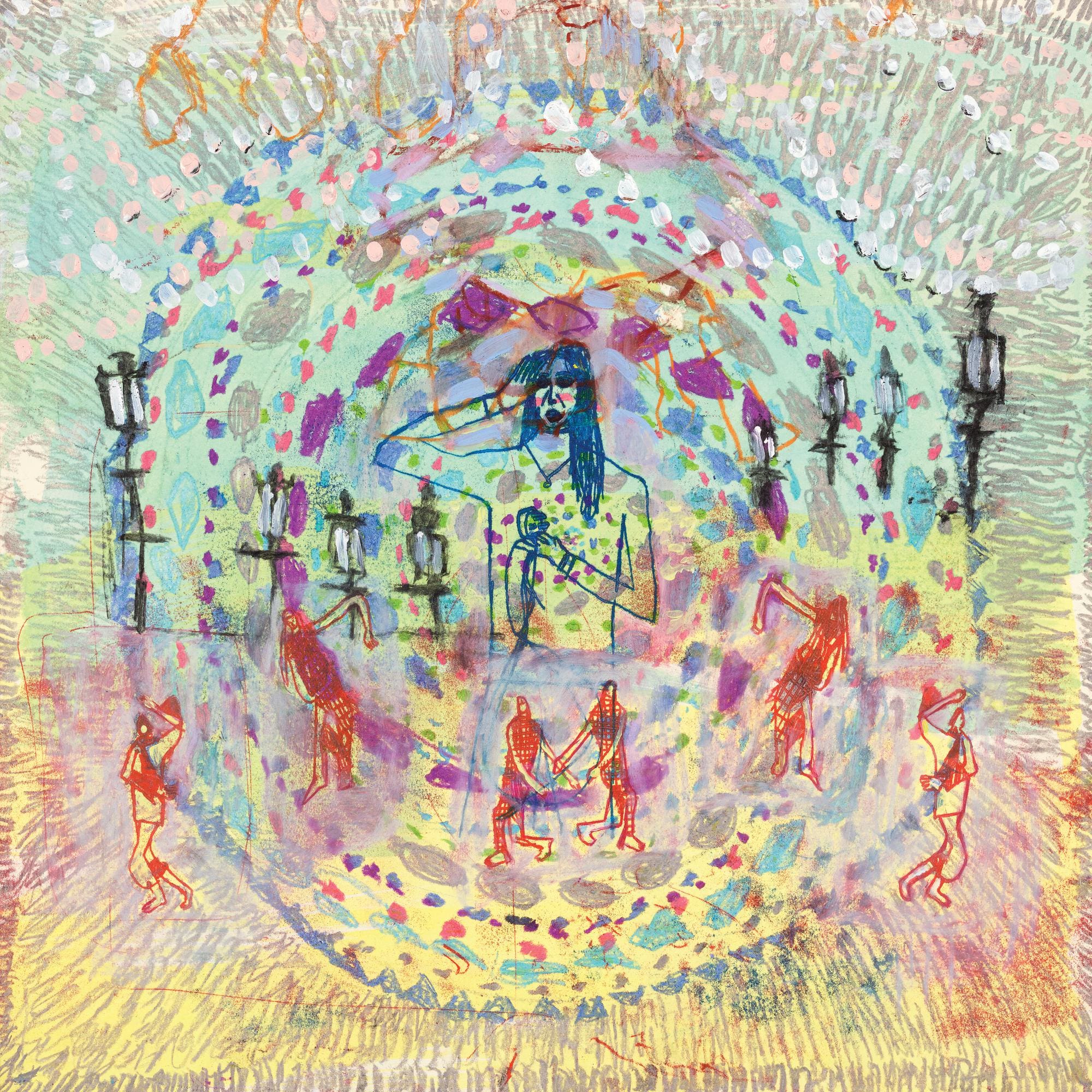
Crazymad, For Me. Artwork: Seatton
All of which aptly set the scene for exploring the dark matter at the heart of Crazymad, For Me – a compellingly layered dissection of the breakdown of a relationship, which ultimately shaped her young adult life.
The break-up – from a person she was formerly in a band with – happened six years ago. So why did now feel like the right time to explore it in her music, as opposed to on her debut LP?
“I really wanted to make an album before I made anything about him,” she reasons. “So the whole first record doesn’t mention anything about that relationship, or anything to do with that time, because I wanted to establish myself away from that.
“Then for the second record, I think I was just ready,” she continues. “For whatever reason, now was the time to make it. I don’t know if it’s because I’m in a good place now, or whether I’m just far enough away from it.”
While she went into the writing process thinking it would result in an album of “forgiveness and love and joy and peace”, she soon found that she was “still really angry.”
“Not necessarily angry towards anyone specifically,” she resumes. “I’m just angry at the fact that there’s absolutely no point to suffering. That was the conclusion I came to. I don’t really believe in, ‘What doesn’t kill you makes you stronger’. Or, ‘You have to suffer, in order to do this…’ You actually don’t. Suffering doesn’t produce anything good for your life. It doesn’t really benefit anyone in any way – it’s just a thing that happens, and then we try to make sense of it. We try to put reasoning onto it.
“But actually, you could have just been having a nice time…”
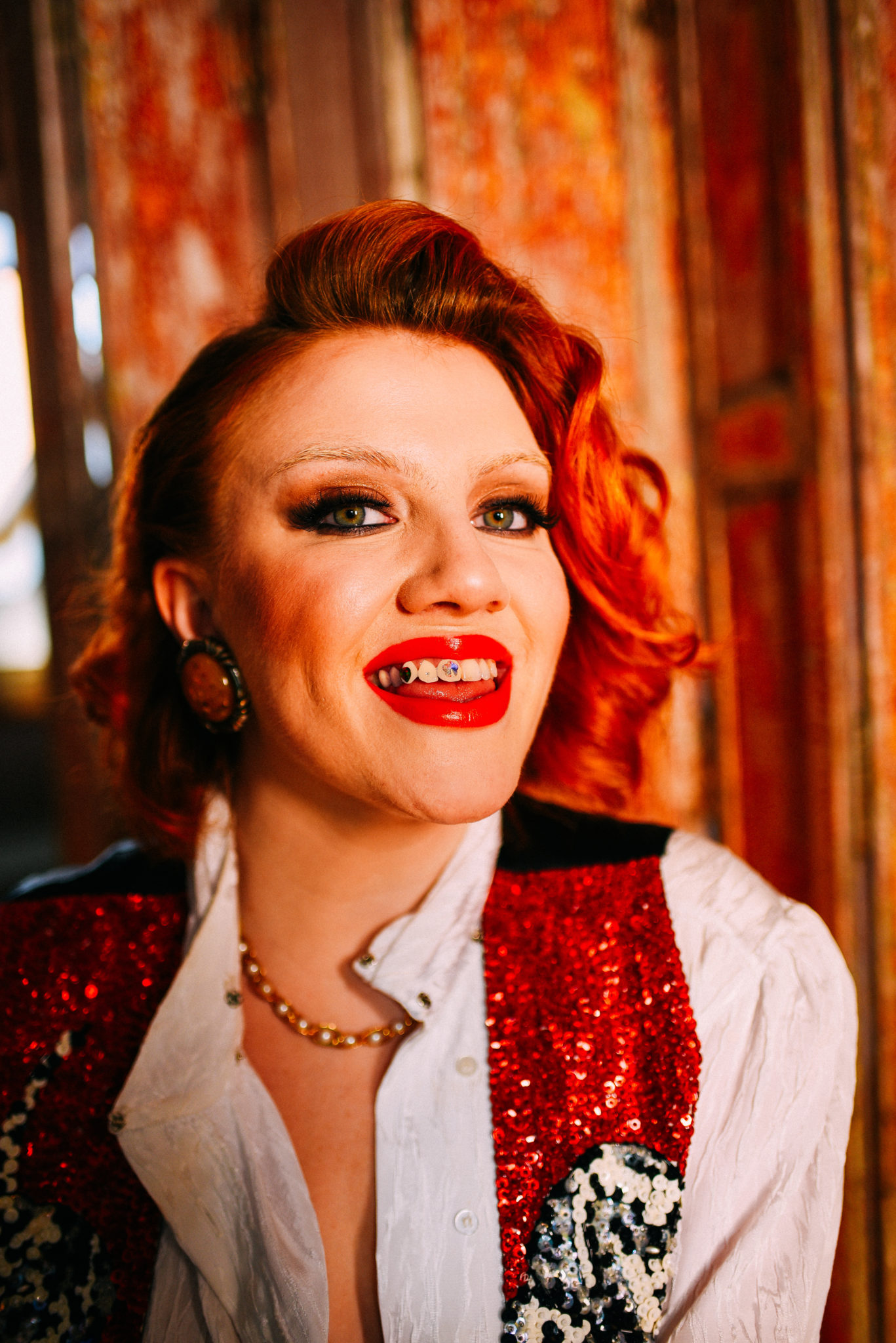
CMAT. Copyright Miguel Ruiz.
Opening track ‘California’ serves as a sort of meta-narrative about her approach to the album – using specific pain and grief from her life, and turning it into music.
“It felt like I wrote that song to give myself a pep-talk to make the record,” she reflects. “The thing I was really worried about, going into it, was making a record about something and someone specific – and then him hearing it, and our old friends hearing it, and my family hearing it. And people thinking I was a moany bitch, and a whingebag, and a drama queen.
“Even though it was something I really wanted to make, initially I was like, ‘I can’t make a record like that – I have to wrap it up in analogies and mythology’,” she adds. “But in the end I was like, ‘I just need to tell the fucking story, move on, and grow up’. If people think I’m a sad case for still being angry about something that ended like six years ago, then they can do that. I don’t really judge them – it makes sense! But I just needed to do it anyway.”
TIME AND PERSPECTIVE
But in a notable divergence from the traditional ‘break-up album’ concept, CMAT isn’t portraying herself as a saint.
“I purposely try to make myself look bad on this record, because I think I was bad,” she states. “I’m letting people in on a very embarrassing, pathetic, and mean side of myself, because I want people to be able to see themselves in it. I’ve no interest in being like [launching into impromptu song]: ‘Fuck that guy, he’s so bad/ I’m so sexy, I’m so glad/ We are not together anymore…’
“There’s definitely a lot of points on the record where I lull people into a false sense of security, by being like, ‘I was a victim’,” she continues. “But in the middle section, I turn it around, to be like, ‘I was actually a fucking dickhead as well’. That’s what I’m trying to do with this record. I don’t think enough people are letting themselves look bad.”
At the same time, CMAT has organically built up a strong fan community of deeply devoted outsiders around her – which brings responsibilities of its own.
“There’s parts of myself where I’m comfortable with being a role model,” she considers. “I think there’s stuff about myself that, from the outside looking in, I would admire, and I could be like, ‘I’m really proud of myself for doing that’. I know that young girls are very appreciative of the fact that I exist, and am loud, and gobby, and not super-duper skinny. And I talk in my own accent. Doing all of the really glamorous pop star stuff, while having all that – I can see why people like that about me.
“But I’m just like, ‘Take it with a pinch of salt, guys!’” she laughs. “You can’t admire everything about me, because I’m not the best girl in the world. No one is!”
While she continues to talk about herself in a disarmingly self-deprecating way, both in her music and in conversation, CMAT still points out that there’s a bit of a double-standard at play.
“It is fucking weird that I’m gobby, bitchy and outspoken – but a man would be the voice of a generation,” she says. “I’m always calling myself a bitch, when I’m probably just doing everything the lads are doing. But I’m a fucking bitch for doing it.”
The new album is littered with references to being ‘crazy’, but as CMAT explains, it’s more to do with reflections on time and perspective.
“I always catch myself saying, like the Vine, ‘I was crazy back then!’” she laughs. “And that’s where a lot of the songs come from. I’d be like, ‘I was crazy two years ago – but I’m so normal now!’ But what I’ve found is, I say that once every two years. So at all times, I am always doing something fucking nuts. I’m probably doing something really insane and unhinged right in this moment! It’s just time and perspective is not telling me that it’s fucking nuts right now.
“I’m also interested in the relationships we have with the former versions of ourselves,” she adds. “That’s where the lyric from ‘Vincent Kompany’ is from: ‘I was crazy back then, and I’m crazy right now’. That’s trying to marry the past version of myself and the current version of myself together. It doesn’t mean that the former version of yourself isn’t yourself. They’re all the same girl.”
THAT’S NOT FEMINISM
Although it seems that, on the surface, the way society views ‘difficult’ or ‘complicated’ women is changing in a slightly more nuanced, compassionate way, CMAT does worry about the state of feminism in 2023.
“I feel like feminism is truly in its flop era right now,” she reflects. “We had a really good time like 10 years ago, and now, feminism has broken into a number of different streams that I don’t necessarily agree with.”
A central one being “consumerism as feminism.”
“Which is like, ‘Buying bath bombs and going to the Barbie movie is a form of self-care’,” she elaborates. “That’s not feminism, that’s just buying shit!
“And then there’s all the wonderful writers, and the wonderful feminists and figureheads that we had in the ‘90s, now becoming transphobic,” she continues. “It’s really disappointing. There’s these amazing people who I used to think were fucking brilliant, and they’ve come out as being extremely sceptical and suspicious of an extremely attacked community. What’s the fucking point in that?”
It’s an issue she’s particularly concerned about when looking at Ireland right now.
“The number one thing that I think people will look back on this time and be absolutely mortified by, is the prolific nature of transphobia infiltrating Ireland,” she asserts. “And the most embarrassing thing about transphobia making its way over to Ireland is that it’s an English fucking import. TERF-ism is imported from the UK. People in this country saw that as a movement, and were like, ‘Yeah, I want to be like them!’ That’s fucking mortifying.
“I just think feminism is very confused right now,” she adds. “We’re not getting back to the point – which is that the girly-pops can be doing whatever they want. And searching for equity, and looking to uplift marginalised women, who are not in a good place in society – to try to give them a bit of a dig-out. But no... I just feel like Bernadette Devlin might have something to say about this. I’d appreciate some guidance on feminism sometime soon…”
HOMOGENISE THE PLACE
For many women, realising you’re turning into your mother is a landmark, if slightly terrifying, rite of passage. It’s a moment that CMAT explores on one of Crazymad, For Me’s stand-out tracks, ‘Where Are Your Kids Tonight’, featuring John Grant.
“She has never spoken to me about it,” CMAT says of her mother’s lack-of-response to the track, laughing. “I’m sure she was very moved by it, but she’s never told me. She’s an Irish woman – she’s not going to talk about her fucking feelings!”
Those unique quirks of the Irish condition are something CMAT’s been reflecting on more and more since leaving Dublin for the UK.
“I just think as a nation we’re extremely pensive,” she posits. “Like that French term, Flâneur – a person who sits at cafés all day, watching the world go by. Observing people, and thinking about them very deeply. That’s what every single person in the country has going on. We’re extremely obsessed with each other. We’re so much more interested in figuring out the inner-workings of each other’s brains, because nobody actually talks about what they’re feeling.
“So I don’t think we’ll ever get any work done,” she shrugs. “But it’s why we’re so good at making music and writing books. The Government is doing whatever it fucking can to rinse the place of all of its culture and chilledness, and homogenise the place. And it’s still failing, because we’ll never be New York, or London – because we’re a different thing, and we’re brilliant. No one’s as smart as us! I’ve yet to meet a nation of people who are as genius, in a very idiosyncratic way. We all just love talking shite.”
So are the Irish really, as that famous quote claims, impervious to psychoanalysis?
“I’ve tried therapy so many times – it does not work on me,” she laughs. “I’m just too Irish. They’ll never crack me!
“I can’t have someone ask me loads of questions about how I’m feeling without asking them about themselves,” she adds. “I’m like, ‘I need to know what’s going on with you, Jessica! How’s your husband?’ And she’s like, ‘You can’t ask me questions, it’s very unprofessional…’”
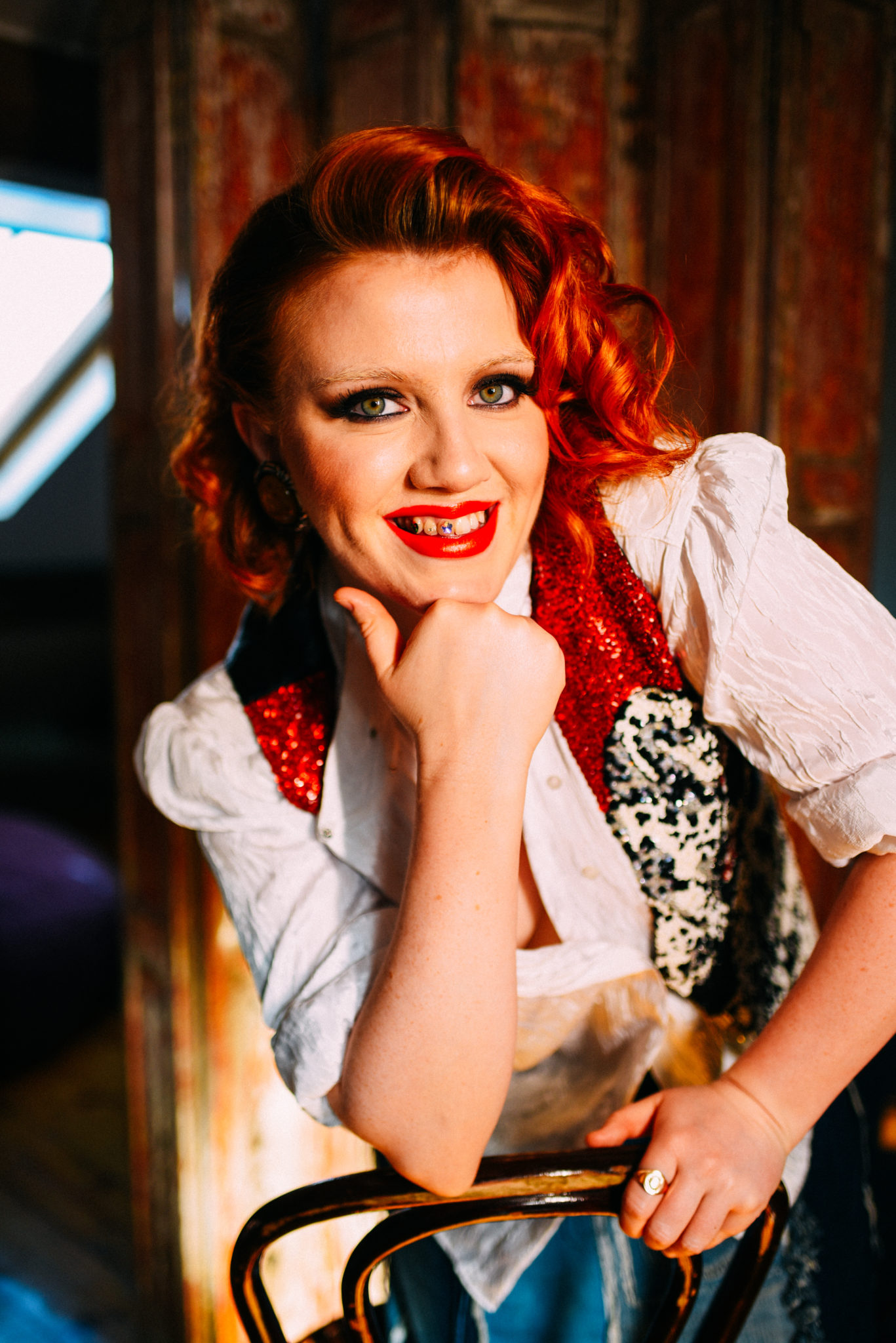
CMAT. Copyright Miguel Ruiz.
Like many artists, living in England is a necessity at this stage in CMAT’s career – with her ultimate, tongue-in-cheek goal being to “hopefully make a million euros, to be able to move back to a one-bedroom flat in Dublin city centre.” But when she’s away, she does miss the “sauce, and the nuance.”
“It’s a really mean thing to say, but they’re just not as funny,” she bemoans. “I do shows in the UK, and they’re like, ‘You should be a stand-up comedian, you’re so funny!’ And I’m like, ‘This is just what people are like at home. I’m not even that funny – my sisters are funnier than me.’
“The people are obviously lovely, and wonderful,” she adds. “I’m literally going out with a very, very, very English person, and I love him dearly.”
But, as an Irish person, her relationship with England will always be “complicated,” she states.
“It’s one thing to move to a different country, but to move to England…” she resumes. “You’re dealing with Union Jacks, and Winston Churchill on the £5 pound note. That’s insane, whoever approved that. No one’s doing anything to hurt anyone, it’s just such a different education over there.
“And obviously all I ever want to talk about is Ireland, and the history of Ireland, and how great Ireland is,” she adds. “But then I come back home and my sisters are like, ‘Ah, you’re hamming up your Irishness, just because you moved over to England!’ And I’m like, ‘Yeah – but if I don’t ham it up, what if I lose it?’”
Despite those cultural nuances, there’s no shortage of thrilling, independent Irish acts gaining recognition on the other side of the Irish Sea right now. As we both agree, West Belfast hip-hop trio “KNEECAP getting signed by a UK label is the best thing to happen to music in a very long time…”
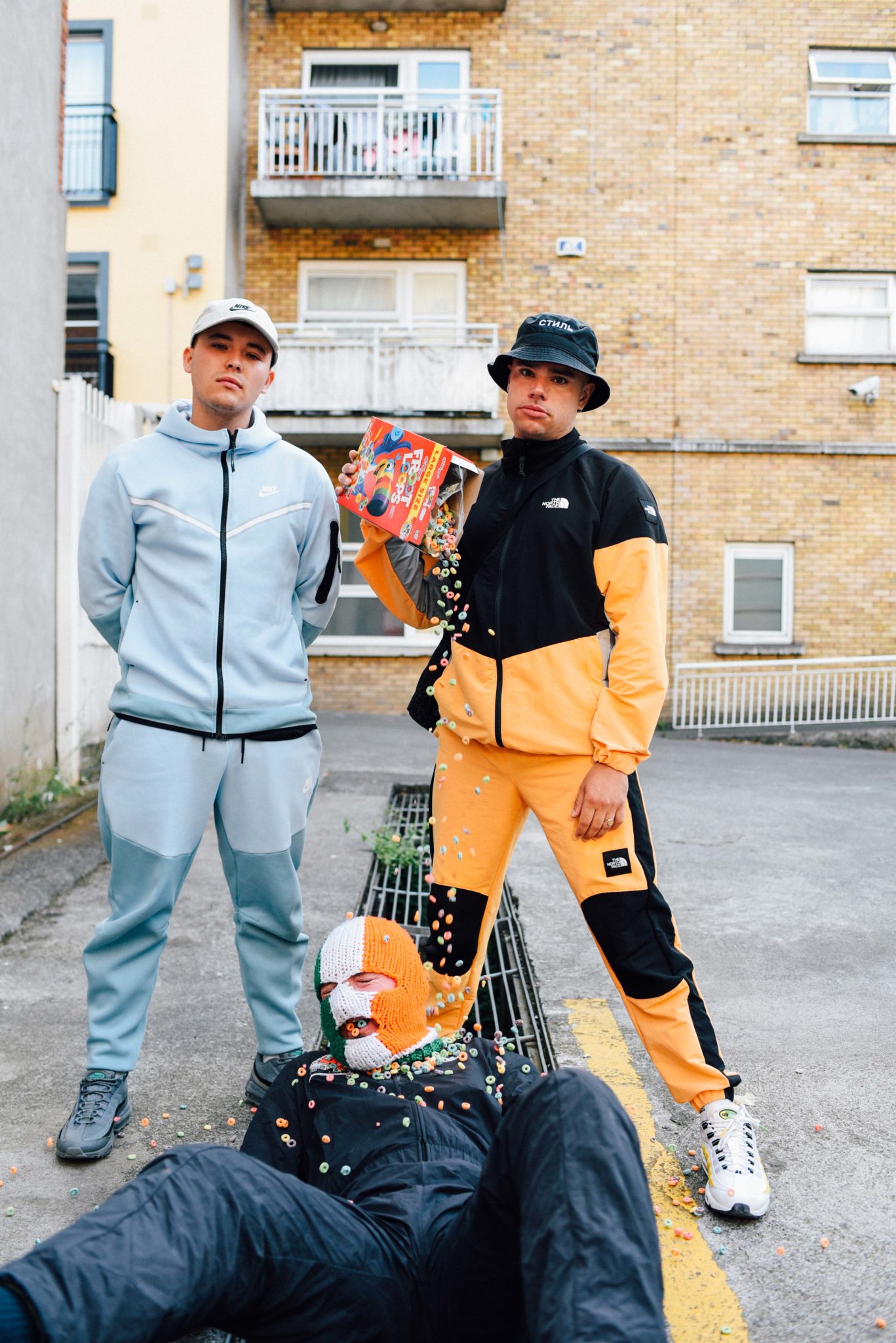
Kneecap. Copyright Miguel Ruiz.
“I love KNEECAP,” she enthuses. “They’re some of the most talented, sensitive, eloquent boys I’ve ever met in my entire life. They’re so emotionally intelligent, and literate, in every way imaginable.
“One night I was playing in Leeds, singing with Yard Act, and KNEECAP were playing in the venue next door,” she recalls. “And I kind of ditched Yard Act – to be fair, I think they had to go home – and went out with KNEECAP. I used to speak Irish semi-fluently, but I’m not really good at it any more, and I told Mo Chara that. And he was like, ‘It’s still inside you!’
“So he was talking to me in Irish, and I was really struggling, but I was able to string a couple of sentences together,” she adds. “And he actually had tears in his eyes, because he was so proud of me! I love them so much. I hope they become the most famous people on the planet.”
TRAUMATISED IN THIS COUNTRY
Like countless other Irish artists, CMAT was deeply affected by the death of Sinéad O’Connor in July. They shared news headlines after the Choice Music Prize this year – having both been honoured with major awards on the night – but CMAT had always felt a special connection to the artist, through her mother, who’s also named Sinéad.
“My mam really closely associated with her,” she explains. “Sinéad O’Connor was in an unmarried mothers home, and my mam was a pregnant teenager in Ireland in the 1980s. She didn’t go, but was asked on multiple occasions by the nuns coming and knocking on the door, did they want to put Sinéad in the home for a while. That was still happening when my mam was a teenager.
“Their lives so closely mirrored each other’s in some ways,” she continues. “They’re both called Sinéad, are from Dublin, are really close in age, and Sinéad had a baby young as well.”
In many respects, Sinéad was “such a relatable figure,” CMAT notes.
“Sinéad O’Connor would go on about something, and people would call her crazy, and say she needed to be locked up,” she remarks. “And if, back in the day, my mother spoke out about something, or if she gave out about someone who had done something bad, they would’ve been like, ‘You’re fucking mental’.
“It was so sad when she died, because I think we all just wanted her to have a happy ending,” she adds. “And she didn’t really get it. But her music was fucking good, and we’re going to have that forever.”
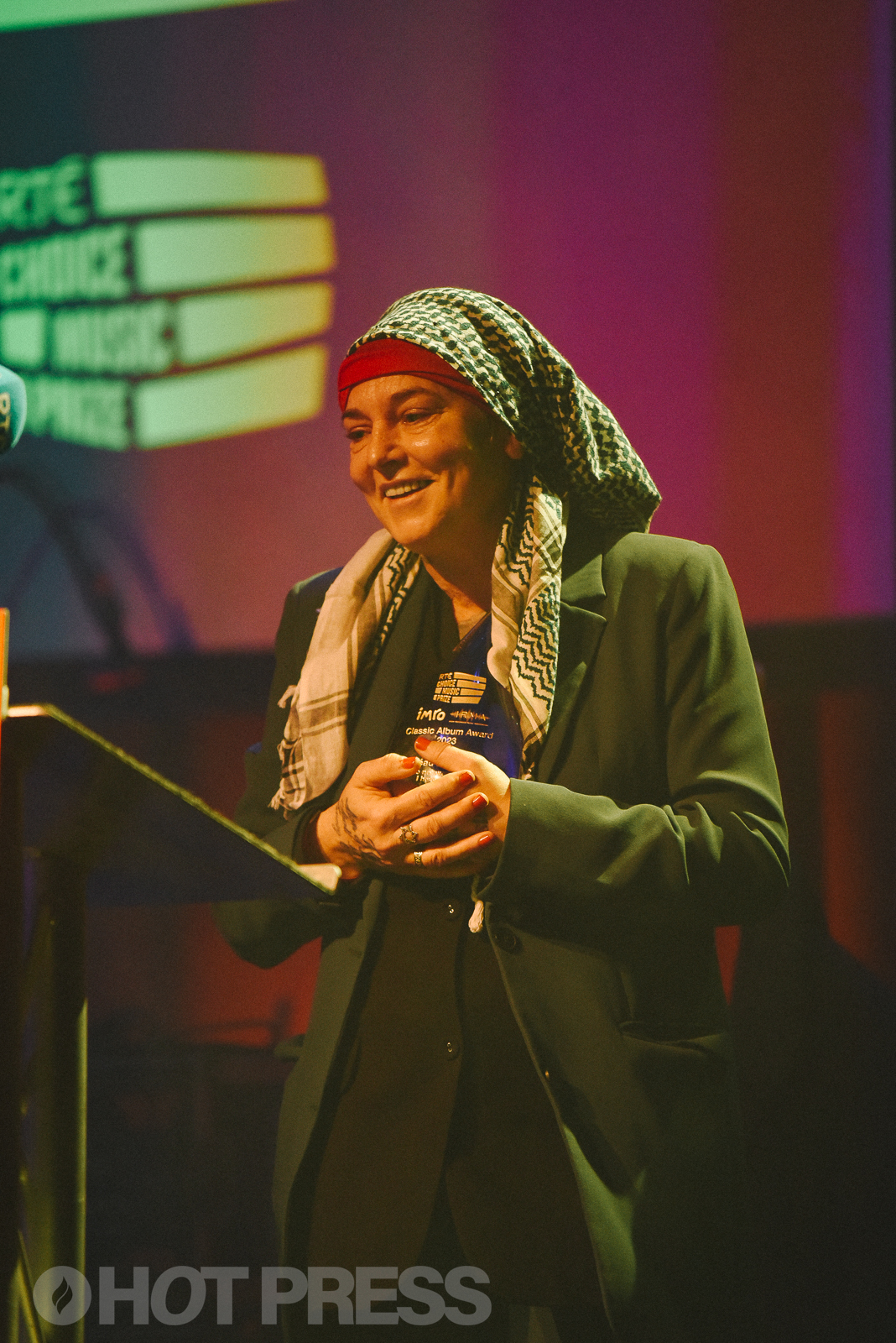
Sinéad O'Connor at RTE Choice Music Prize. Thursday 9th of March 2023. Copyright Miguel Ruiz.
Many would agree that Sinéad O’Connor kicked off a culture of defiance and activism in pop music that continues to this day. CMAT, in those footsteps, has never been afraid to speak her mind – using her platform to advocate for trans rights, among other issues. But she feels that “the culture of the economy” in Ireland is another matter that desperately needs addressing.
“As in, landlordism, and the accepted nature of the neo-capitalist snake that’s infiltrated Ireland,” she elaborates. “There’s not enough people going on about the state of Dublin – and whenever they do, they’re told they’re hamming up their Irishness too much, i.e., the Fontaines. They got so much backlash for living in London and giving out about Dublin. And it’s so unwarranted.
“I really, really relate to that experience, and that record,” she says of Fontaines D.C.’s 2022 album, Skinty Fia. “Genuinely, I think it’s one of the best records I’ve ever heard in my life. When I won the Choice Prize – being fucking real with you – I was a bit like, ‘Should’ve been Skinty Fia…’”

CMAT. Copyright Miguel Ruiz.
As CMAT notes, “Talking about stuff like money, poverty, wealth, class, and the economy” can be seen by many as “embarrassing”, because no one will always be on the correct side of things – and artists like Fontaines D.C. “are not allowed to talk about it” because they’re perceived to be “too posh.”
“So someone else has to talk about it, but no one else fucking is,” she remarks. “No one else is bothering their hole.
“We’ve just let everything slip,” she continues. “I’m almost 100% positive that my entire class from school is abroad. My sister’s in Sydney, my little brother’s about to move to Sydney. That’s three out of the four children in my family not living in Ireland anymore. It’s insane. And I genuinely feel like, of all the things that nobody is really trying to figure out a solution to, it’s that.”
CMAT reveals that her reflections on the “reasons why this has happened right now” are something she’s already considering exploring on her third album.
“I can trace it all back to the early 2000s, and the greed there,” she tells me. “And how that absolutely fucking ruined the village that I grew up in. People are a bit traumatised in this country. We’ve been traumatised by the last 20 years, and by a specific couple of figures who I’d love to name – and maybe I will in a while…”
One thing’s for sure though. “If Bertie Ahern goes for the presidency, I will actually make it my personal fucking mission to make sure that he doesn’t win,” she declares.
A VERY COMPLICATED RELATIONSHIP
Of course, another force that has shaped the face of modern Ireland, on many levels, is the church – something CMAT has made numerous references to across her work.
“My life was structured around the Catholic Church for the first 12 years of my life,” she reflects now. “I did my Communion, went to Mass, did the Christmas Mass – did everything. And what’s funny is, I loved the church. I hated going to Mass, because I found that boring – but the minute that they let me start singing in the choir, I was like, ‘Here I am, Lord! It is I, Lord!’ I fucking loved that shit.
“So I love religion, in some ways,” she continues. “I love the structure it gives to a community. And I love the music, and the gear. I love looking at a big fucking church building. And I love seeing a priest in the garb, and the fresh flowers. The texture of a Catholic church is just the most homely, warming, beautiful thing to me.”
She pauses, before continuing.
“Obviously, not a big fan of the Roman Catholic Church itself, and the way that’s structured – because they’re fucked! And they also literally ruined this country. It’s a very complicated relationship that I have with the Catholic Church, as a result of that.”
She feels that the remnants of Catholic education and upbringings continue to inform the music of “a lot of young Irish artists.”
“I was thinking about this the other day,” she notes. “My first album cover’s in a Catholic church, Kojaque’s coming out of a fucking casket in a church on the cover of his first actual album [Town’s Dead], and Fontaines shot the music video for ‘I Love You’ in a church. We’re all at it, and we’re all clearly affected by it. It’s a low level thing that’s always pumping away.
“It’s this warming presence that we would’ve loved so much as kids – that now has this really big ugly stain on it,” she adds. “And it’s really hard to marry those two things together.
“So again, I think we’re all a bit fucked…” she concludes. “We are class, though!”
• Crazymad, For Me is out now










